The Impact of Digitalization and Industry 4.0 on Hospitality Business
VerifiedAdded on 2020/11/12
|16
|4945
|329
Report
AI Summary
This business report examines the increasing use of digital transformation and the impact of Industry 4.0 on the hospitality industry in the UK. It explores key changes like customer expectations, competition, and product/service offerings. The report details the impact of digitalization, including innovation, service automation, and location-based services. It also covers industry 4.0's influence on improving decision-making and innovation. Organizational challenges such as competition, customer expectations, technology adoption, and staff retention are addressed, alongside an analysis of operational strategies, resources, and capabilities needed for digital transformation. The report also discusses continuous learning, the benefits of digital initiatives, and proposes digital solutions, offering recommendations for the future of the hospitality sector. It also includes topics like order winners, value propositions, strengths, and limitations in operational strategies.
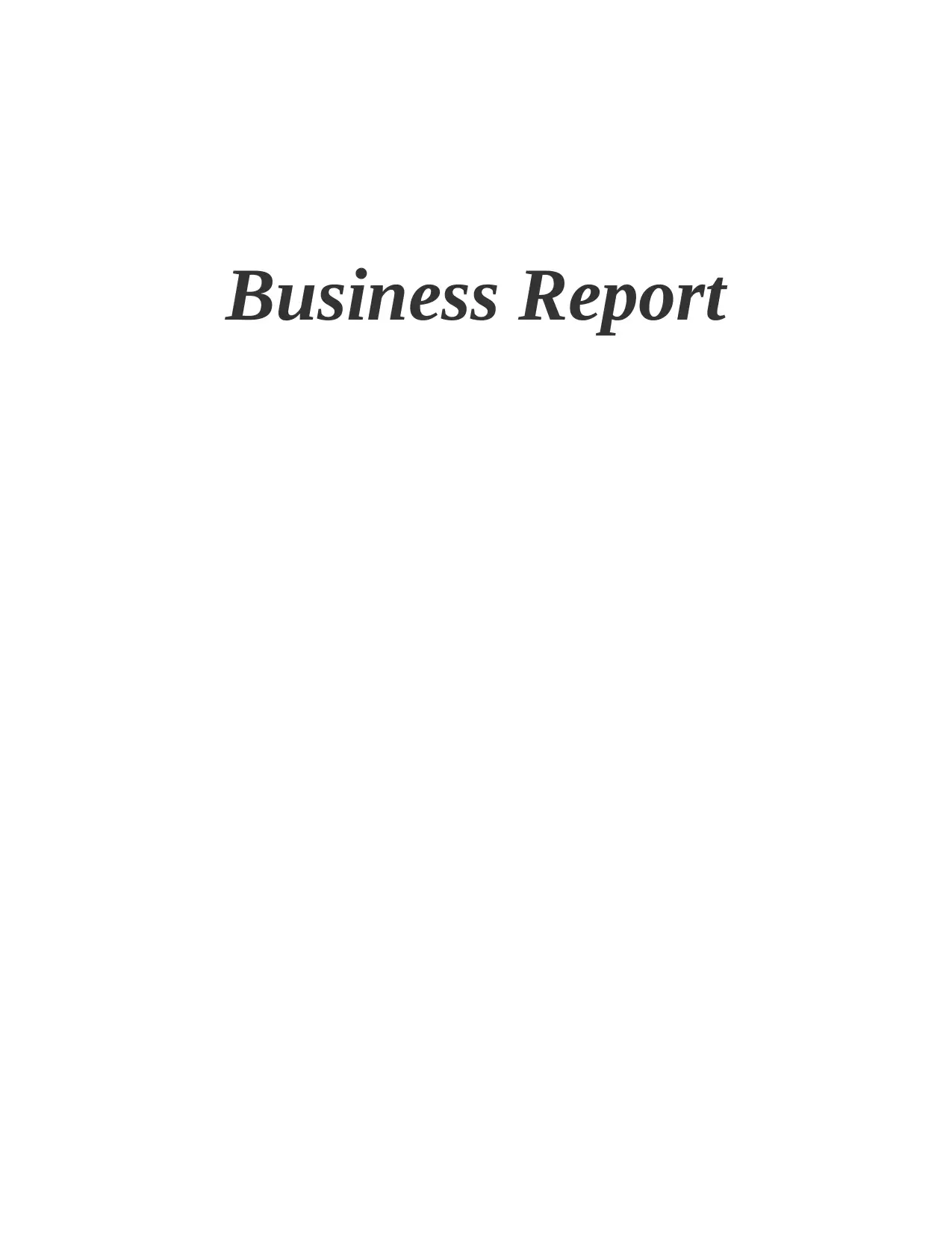
Business Report
Paraphrase This Document
Need a fresh take? Get an instant paraphrase of this document with our AI Paraphraser
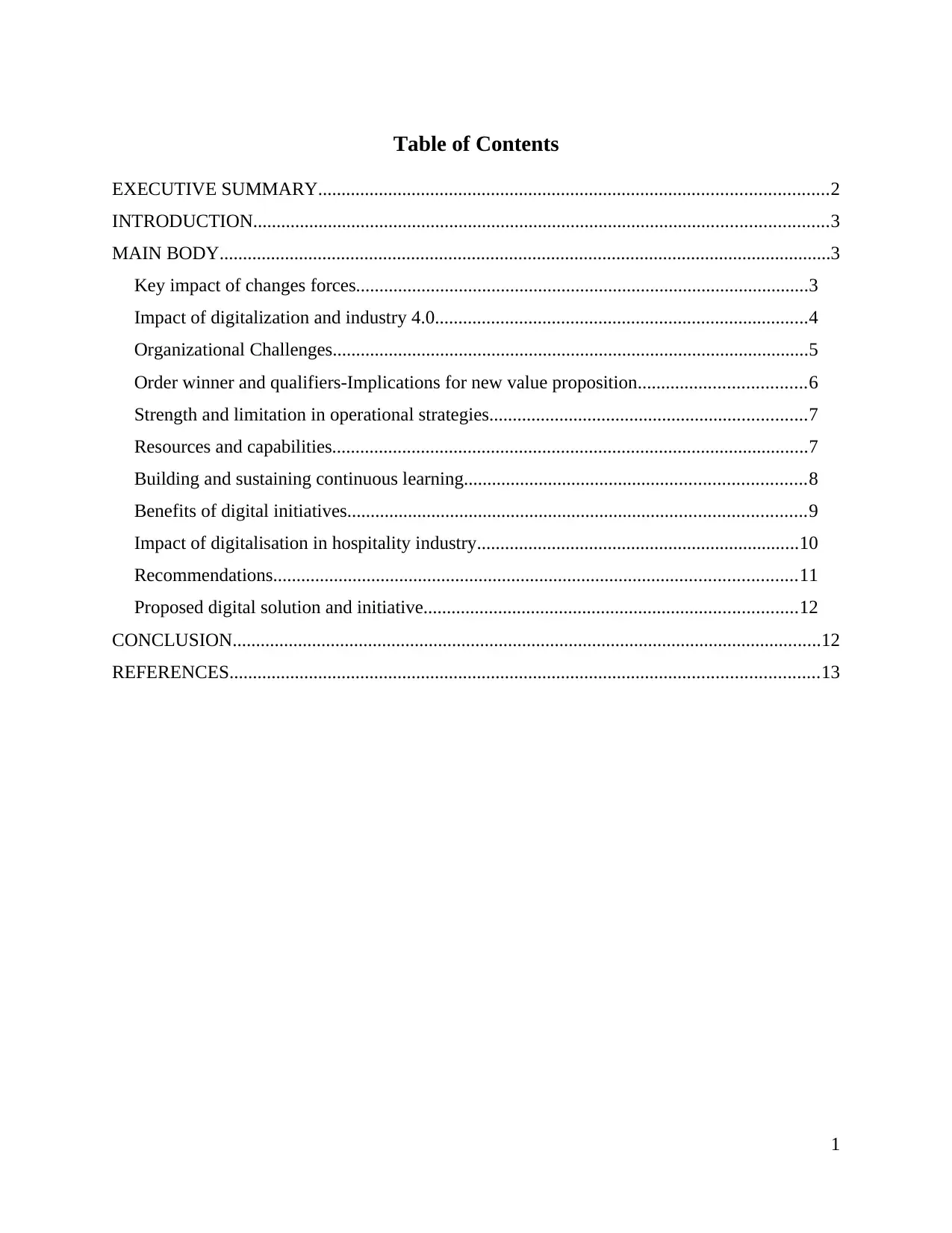
Table of Contents
EXECUTIVE SUMMARY.............................................................................................................2
INTRODUCTION...........................................................................................................................3
MAIN BODY...................................................................................................................................3
Key impact of changes forces.................................................................................................3
Impact of digitalization and industry 4.0................................................................................4
Organizational Challenges......................................................................................................5
Order winner and qualifiers-Implications for new value proposition....................................6
Strength and limitation in operational strategies....................................................................7
Resources and capabilities......................................................................................................7
Building and sustaining continuous learning.........................................................................8
Benefits of digital initiatives..................................................................................................9
Impact of digitalisation in hospitality industry.....................................................................10
Recommendations................................................................................................................11
Proposed digital solution and initiative................................................................................12
CONCLUSION..............................................................................................................................12
REFERENCES..............................................................................................................................13
1
EXECUTIVE SUMMARY.............................................................................................................2
INTRODUCTION...........................................................................................................................3
MAIN BODY...................................................................................................................................3
Key impact of changes forces.................................................................................................3
Impact of digitalization and industry 4.0................................................................................4
Organizational Challenges......................................................................................................5
Order winner and qualifiers-Implications for new value proposition....................................6
Strength and limitation in operational strategies....................................................................7
Resources and capabilities......................................................................................................7
Building and sustaining continuous learning.........................................................................8
Benefits of digital initiatives..................................................................................................9
Impact of digitalisation in hospitality industry.....................................................................10
Recommendations................................................................................................................11
Proposed digital solution and initiative................................................................................12
CONCLUSION..............................................................................................................................12
REFERENCES..............................................................................................................................13
1
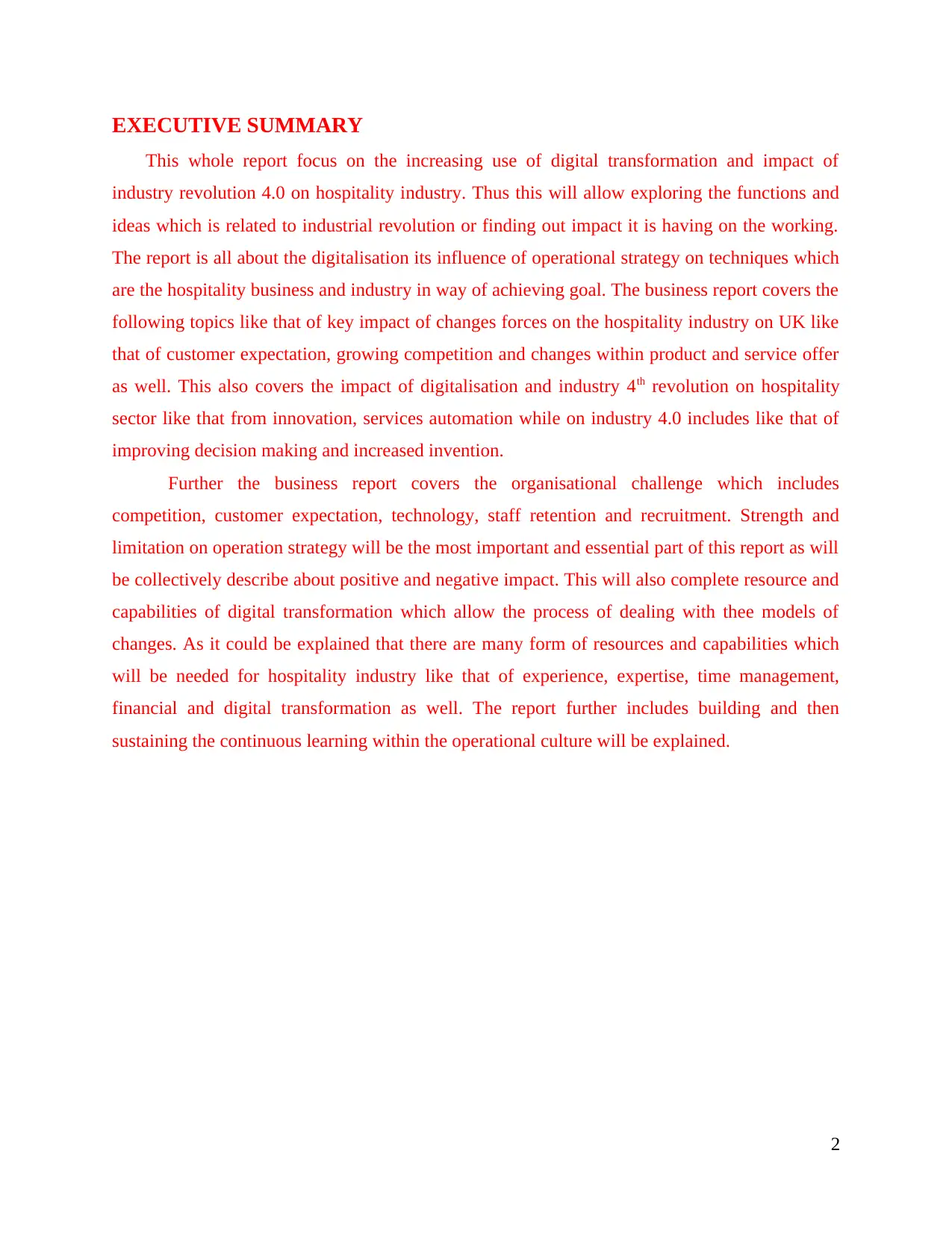
EXECUTIVE SUMMARY
This whole report focus on the increasing use of digital transformation and impact of
industry revolution 4.0 on hospitality industry. Thus this will allow exploring the functions and
ideas which is related to industrial revolution or finding out impact it is having on the working.
The report is all about the digitalisation its influence of operational strategy on techniques which
are the hospitality business and industry in way of achieving goal. The business report covers the
following topics like that of key impact of changes forces on the hospitality industry on UK like
that of customer expectation, growing competition and changes within product and service offer
as well. This also covers the impact of digitalisation and industry 4th revolution on hospitality
sector like that from innovation, services automation while on industry 4.0 includes like that of
improving decision making and increased invention.
Further the business report covers the organisational challenge which includes
competition, customer expectation, technology, staff retention and recruitment. Strength and
limitation on operation strategy will be the most important and essential part of this report as will
be collectively describe about positive and negative impact. This will also complete resource and
capabilities of digital transformation which allow the process of dealing with thee models of
changes. As it could be explained that there are many form of resources and capabilities which
will be needed for hospitality industry like that of experience, expertise, time management,
financial and digital transformation as well. The report further includes building and then
sustaining the continuous learning within the operational culture will be explained.
2
This whole report focus on the increasing use of digital transformation and impact of
industry revolution 4.0 on hospitality industry. Thus this will allow exploring the functions and
ideas which is related to industrial revolution or finding out impact it is having on the working.
The report is all about the digitalisation its influence of operational strategy on techniques which
are the hospitality business and industry in way of achieving goal. The business report covers the
following topics like that of key impact of changes forces on the hospitality industry on UK like
that of customer expectation, growing competition and changes within product and service offer
as well. This also covers the impact of digitalisation and industry 4th revolution on hospitality
sector like that from innovation, services automation while on industry 4.0 includes like that of
improving decision making and increased invention.
Further the business report covers the organisational challenge which includes
competition, customer expectation, technology, staff retention and recruitment. Strength and
limitation on operation strategy will be the most important and essential part of this report as will
be collectively describe about positive and negative impact. This will also complete resource and
capabilities of digital transformation which allow the process of dealing with thee models of
changes. As it could be explained that there are many form of resources and capabilities which
will be needed for hospitality industry like that of experience, expertise, time management,
financial and digital transformation as well. The report further includes building and then
sustaining the continuous learning within the operational culture will be explained.
2
⊘ This is a preview!⊘
Do you want full access?
Subscribe today to unlock all pages.

Trusted by 1+ million students worldwide
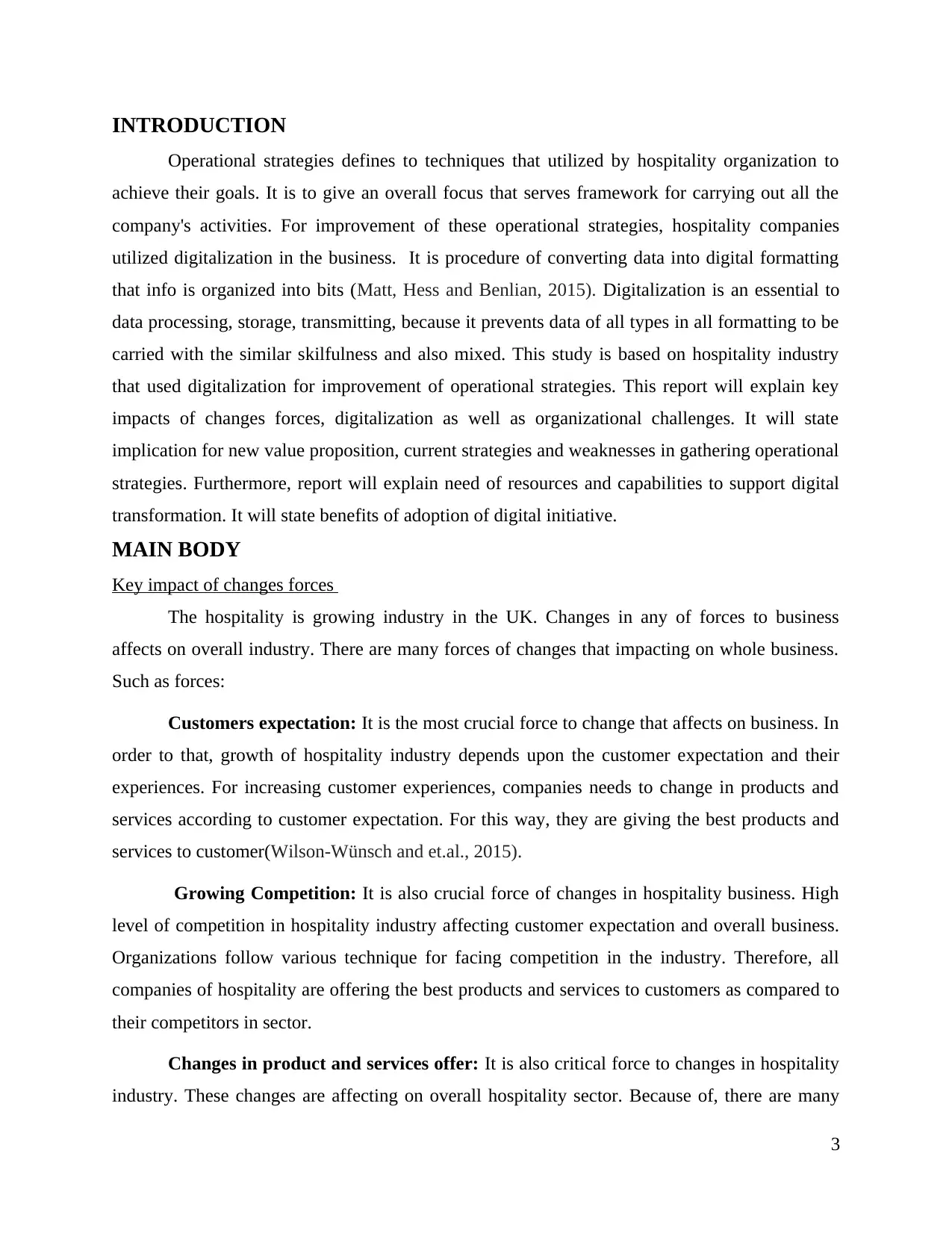
INTRODUCTION
Operational strategies defines to techniques that utilized by hospitality organization to
achieve their goals. It is to give an overall focus that serves framework for carrying out all the
company's activities. For improvement of these operational strategies, hospitality companies
utilized digitalization in the business. It is procedure of converting data into digital formatting
that info is organized into bits (Matt, Hess and Benlian, 2015). Digitalization is an essential to
data processing, storage, transmitting, because it prevents data of all types in all formatting to be
carried with the similar skilfulness and also mixed. This study is based on hospitality industry
that used digitalization for improvement of operational strategies. This report will explain key
impacts of changes forces, digitalization as well as organizational challenges. It will state
implication for new value proposition, current strategies and weaknesses in gathering operational
strategies. Furthermore, report will explain need of resources and capabilities to support digital
transformation. It will state benefits of adoption of digital initiative.
MAIN BODY
Key impact of changes forces
The hospitality is growing industry in the UK. Changes in any of forces to business
affects on overall industry. There are many forces of changes that impacting on whole business.
Such as forces:
Customers expectation: It is the most crucial force to change that affects on business. In
order to that, growth of hospitality industry depends upon the customer expectation and their
experiences. For increasing customer experiences, companies needs to change in products and
services according to customer expectation. For this way, they are giving the best products and
services to customer(Wilson-Wünsch and et.al., 2015).
Growing Competition: It is also crucial force of changes in hospitality business. High
level of competition in hospitality industry affecting customer expectation and overall business.
Organizations follow various technique for facing competition in the industry. Therefore, all
companies of hospitality are offering the best products and services to customers as compared to
their competitors in sector.
Changes in product and services offer: It is also critical force to changes in hospitality
industry. These changes are affecting on overall hospitality sector. Because of, there are many
3
Operational strategies defines to techniques that utilized by hospitality organization to
achieve their goals. It is to give an overall focus that serves framework for carrying out all the
company's activities. For improvement of these operational strategies, hospitality companies
utilized digitalization in the business. It is procedure of converting data into digital formatting
that info is organized into bits (Matt, Hess and Benlian, 2015). Digitalization is an essential to
data processing, storage, transmitting, because it prevents data of all types in all formatting to be
carried with the similar skilfulness and also mixed. This study is based on hospitality industry
that used digitalization for improvement of operational strategies. This report will explain key
impacts of changes forces, digitalization as well as organizational challenges. It will state
implication for new value proposition, current strategies and weaknesses in gathering operational
strategies. Furthermore, report will explain need of resources and capabilities to support digital
transformation. It will state benefits of adoption of digital initiative.
MAIN BODY
Key impact of changes forces
The hospitality is growing industry in the UK. Changes in any of forces to business
affects on overall industry. There are many forces of changes that impacting on whole business.
Such as forces:
Customers expectation: It is the most crucial force to change that affects on business. In
order to that, growth of hospitality industry depends upon the customer expectation and their
experiences. For increasing customer experiences, companies needs to change in products and
services according to customer expectation. For this way, they are giving the best products and
services to customer(Wilson-Wünsch and et.al., 2015).
Growing Competition: It is also crucial force of changes in hospitality business. High
level of competition in hospitality industry affecting customer expectation and overall business.
Organizations follow various technique for facing competition in the industry. Therefore, all
companies of hospitality are offering the best products and services to customers as compared to
their competitors in sector.
Changes in product and services offer: It is also critical force to changes in hospitality
industry. These changes are affecting on overall hospitality sector. Because of, there are many
3
Paraphrase This Document
Need a fresh take? Get an instant paraphrase of this document with our AI Paraphraser
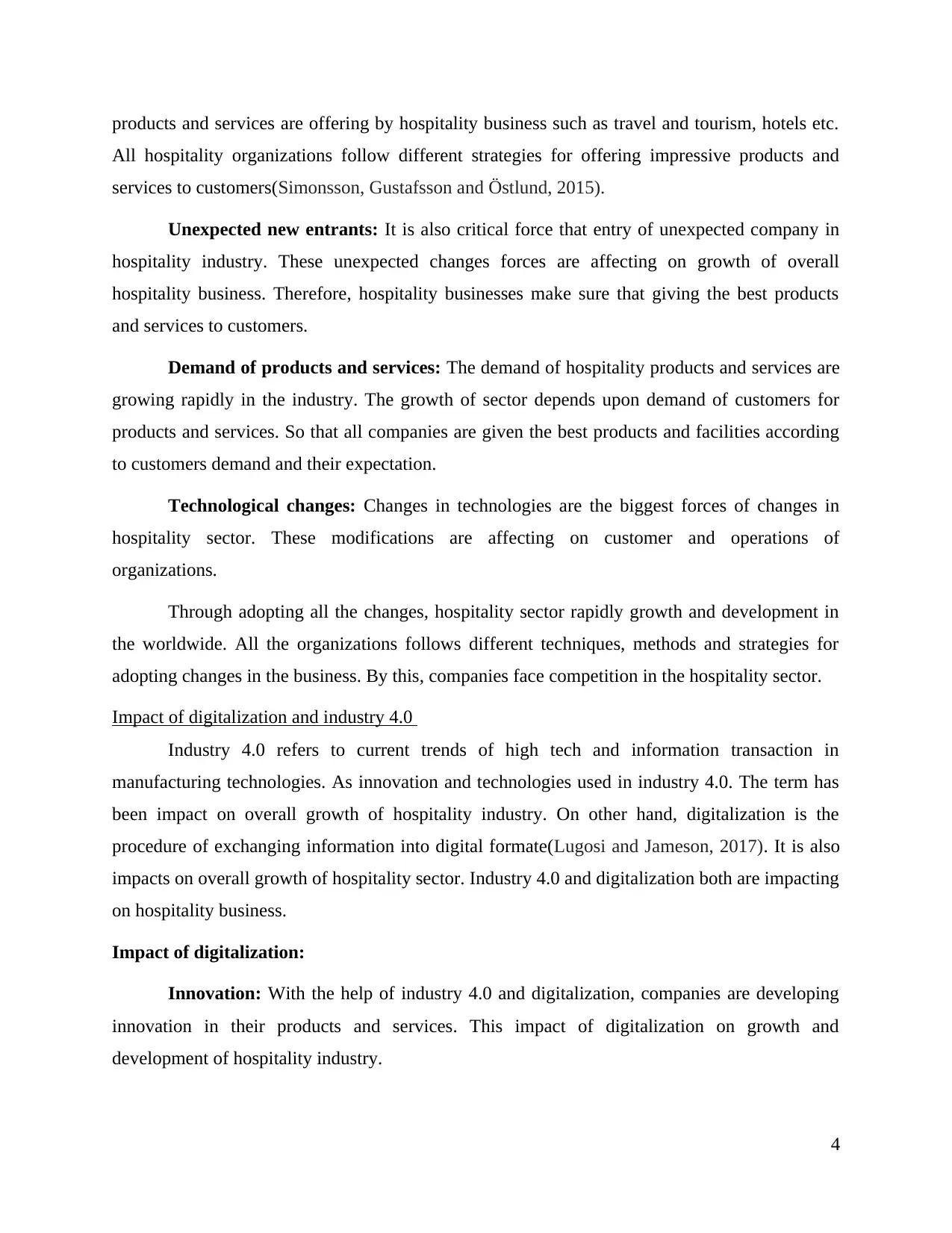
products and services are offering by hospitality business such as travel and tourism, hotels etc.
All hospitality organizations follow different strategies for offering impressive products and
services to customers(Simonsson, Gustafsson and Östlund, 2015).
Unexpected new entrants: It is also critical force that entry of unexpected company in
hospitality industry. These unexpected changes forces are affecting on growth of overall
hospitality business. Therefore, hospitality businesses make sure that giving the best products
and services to customers.
Demand of products and services: The demand of hospitality products and services are
growing rapidly in the industry. The growth of sector depends upon demand of customers for
products and services. So that all companies are given the best products and facilities according
to customers demand and their expectation.
Technological changes: Changes in technologies are the biggest forces of changes in
hospitality sector. These modifications are affecting on customer and operations of
organizations.
Through adopting all the changes, hospitality sector rapidly growth and development in
the worldwide. All the organizations follows different techniques, methods and strategies for
adopting changes in the business. By this, companies face competition in the hospitality sector.
Impact of digitalization and industry 4.0
Industry 4.0 refers to current trends of high tech and information transaction in
manufacturing technologies. As innovation and technologies used in industry 4.0. The term has
been impact on overall growth of hospitality industry. On other hand, digitalization is the
procedure of exchanging information into digital formate(Lugosi and Jameson, 2017). It is also
impacts on overall growth of hospitality sector. Industry 4.0 and digitalization both are impacting
on hospitality business.
Impact of digitalization:
Innovation: With the help of industry 4.0 and digitalization, companies are developing
innovation in their products and services. This impact of digitalization on growth and
development of hospitality industry.
4
All hospitality organizations follow different strategies for offering impressive products and
services to customers(Simonsson, Gustafsson and Östlund, 2015).
Unexpected new entrants: It is also critical force that entry of unexpected company in
hospitality industry. These unexpected changes forces are affecting on growth of overall
hospitality business. Therefore, hospitality businesses make sure that giving the best products
and services to customers.
Demand of products and services: The demand of hospitality products and services are
growing rapidly in the industry. The growth of sector depends upon demand of customers for
products and services. So that all companies are given the best products and facilities according
to customers demand and their expectation.
Technological changes: Changes in technologies are the biggest forces of changes in
hospitality sector. These modifications are affecting on customer and operations of
organizations.
Through adopting all the changes, hospitality sector rapidly growth and development in
the worldwide. All the organizations follows different techniques, methods and strategies for
adopting changes in the business. By this, companies face competition in the hospitality sector.
Impact of digitalization and industry 4.0
Industry 4.0 refers to current trends of high tech and information transaction in
manufacturing technologies. As innovation and technologies used in industry 4.0. The term has
been impact on overall growth of hospitality industry. On other hand, digitalization is the
procedure of exchanging information into digital formate(Lugosi and Jameson, 2017). It is also
impacts on overall growth of hospitality sector. Industry 4.0 and digitalization both are impacting
on hospitality business.
Impact of digitalization:
Innovation: With the help of industry 4.0 and digitalization, companies are developing
innovation in their products and services. This impact of digitalization on growth and
development of hospitality industry.
4
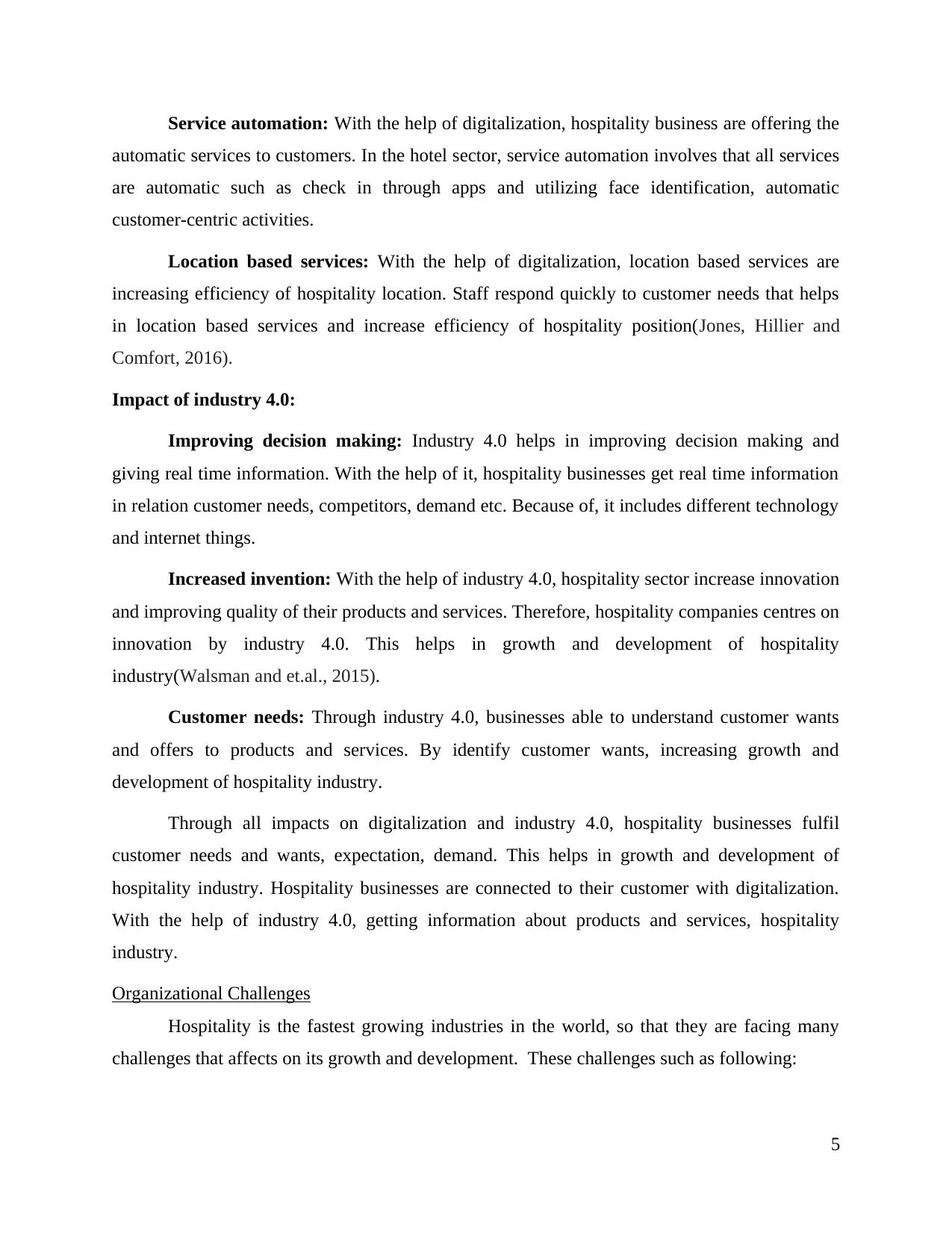
Service automation: With the help of digitalization, hospitality business are offering the
automatic services to customers. In the hotel sector, service automation involves that all services
are automatic such as check in through apps and utilizing face identification, automatic
customer-centric activities.
Location based services: With the help of digitalization, location based services are
increasing efficiency of hospitality location. Staff respond quickly to customer needs that helps
in location based services and increase efficiency of hospitality position(Jones, Hillier and
Comfort, 2016).
Impact of industry 4.0:
Improving decision making: Industry 4.0 helps in improving decision making and
giving real time information. With the help of it, hospitality businesses get real time information
in relation customer needs, competitors, demand etc. Because of, it includes different technology
and internet things.
Increased invention: With the help of industry 4.0, hospitality sector increase innovation
and improving quality of their products and services. Therefore, hospitality companies centres on
innovation by industry 4.0. This helps in growth and development of hospitality
industry(Walsman and et.al., 2015).
Customer needs: Through industry 4.0, businesses able to understand customer wants
and offers to products and services. By identify customer wants, increasing growth and
development of hospitality industry.
Through all impacts on digitalization and industry 4.0, hospitality businesses fulfil
customer needs and wants, expectation, demand. This helps in growth and development of
hospitality industry. Hospitality businesses are connected to their customer with digitalization.
With the help of industry 4.0, getting information about products and services, hospitality
industry.
Organizational Challenges
Hospitality is the fastest growing industries in the world, so that they are facing many
challenges that affects on its growth and development. These challenges such as following:
5
automatic services to customers. In the hotel sector, service automation involves that all services
are automatic such as check in through apps and utilizing face identification, automatic
customer-centric activities.
Location based services: With the help of digitalization, location based services are
increasing efficiency of hospitality location. Staff respond quickly to customer needs that helps
in location based services and increase efficiency of hospitality position(Jones, Hillier and
Comfort, 2016).
Impact of industry 4.0:
Improving decision making: Industry 4.0 helps in improving decision making and
giving real time information. With the help of it, hospitality businesses get real time information
in relation customer needs, competitors, demand etc. Because of, it includes different technology
and internet things.
Increased invention: With the help of industry 4.0, hospitality sector increase innovation
and improving quality of their products and services. Therefore, hospitality companies centres on
innovation by industry 4.0. This helps in growth and development of hospitality
industry(Walsman and et.al., 2015).
Customer needs: Through industry 4.0, businesses able to understand customer wants
and offers to products and services. By identify customer wants, increasing growth and
development of hospitality industry.
Through all impacts on digitalization and industry 4.0, hospitality businesses fulfil
customer needs and wants, expectation, demand. This helps in growth and development of
hospitality industry. Hospitality businesses are connected to their customer with digitalization.
With the help of industry 4.0, getting information about products and services, hospitality
industry.
Organizational Challenges
Hospitality is the fastest growing industries in the world, so that they are facing many
challenges that affects on its growth and development. These challenges such as following:
5
⊘ This is a preview!⊘
Do you want full access?
Subscribe today to unlock all pages.

Trusted by 1+ million students worldwide
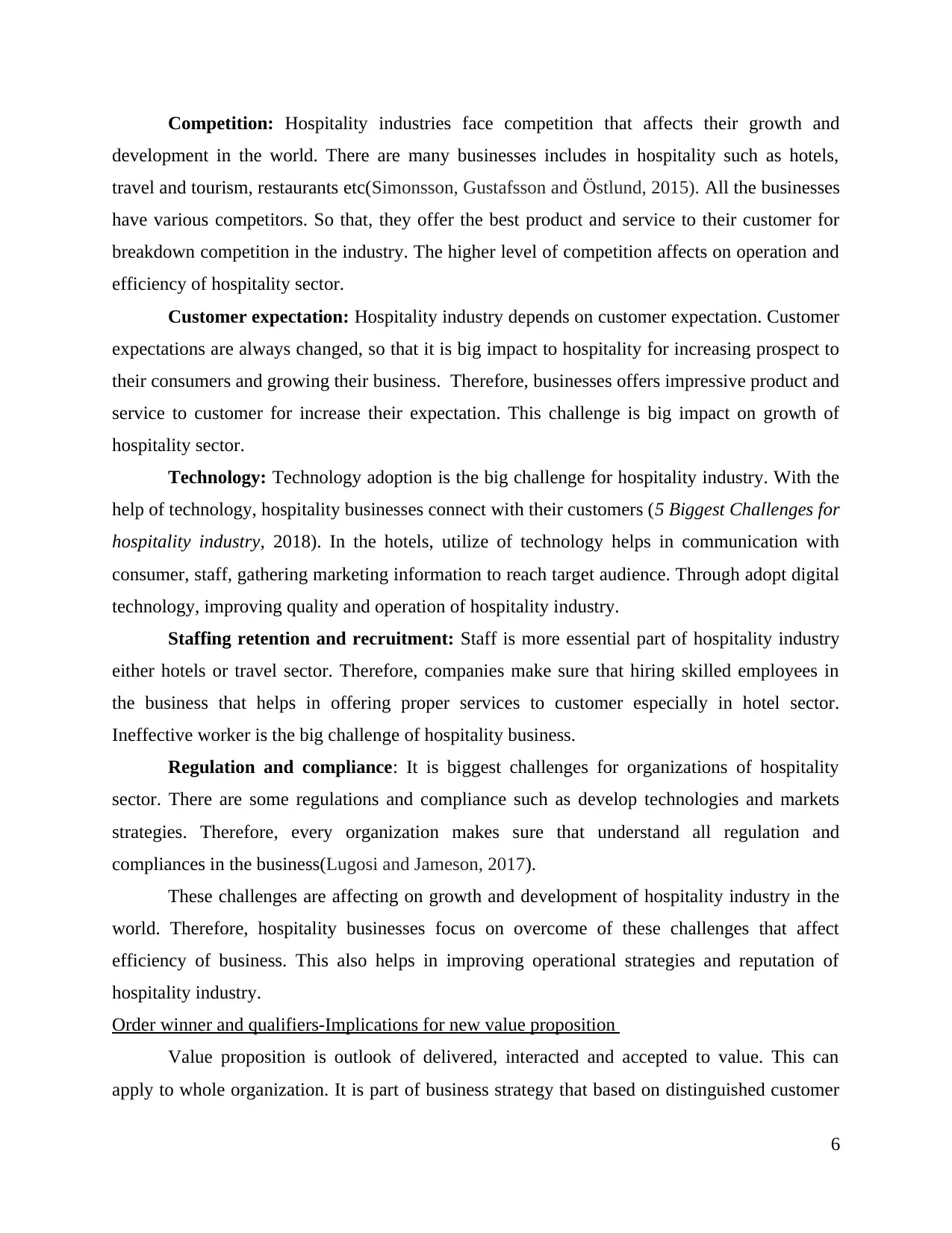
Competition: Hospitality industries face competition that affects their growth and
development in the world. There are many businesses includes in hospitality such as hotels,
travel and tourism, restaurants etc(Simonsson, Gustafsson and Östlund, 2015). All the businesses
have various competitors. So that, they offer the best product and service to their customer for
breakdown competition in the industry. The higher level of competition affects on operation and
efficiency of hospitality sector.
Customer expectation: Hospitality industry depends on customer expectation. Customer
expectations are always changed, so that it is big impact to hospitality for increasing prospect to
their consumers and growing their business. Therefore, businesses offers impressive product and
service to customer for increase their expectation. This challenge is big impact on growth of
hospitality sector.
Technology: Technology adoption is the big challenge for hospitality industry. With the
help of technology, hospitality businesses connect with their customers (5 Biggest Challenges for
hospitality industry, 2018). In the hotels, utilize of technology helps in communication with
consumer, staff, gathering marketing information to reach target audience. Through adopt digital
technology, improving quality and operation of hospitality industry.
Staffing retention and recruitment: Staff is more essential part of hospitality industry
either hotels or travel sector. Therefore, companies make sure that hiring skilled employees in
the business that helps in offering proper services to customer especially in hotel sector.
Ineffective worker is the big challenge of hospitality business.
Regulation and compliance: It is biggest challenges for organizations of hospitality
sector. There are some regulations and compliance such as develop technologies and markets
strategies. Therefore, every organization makes sure that understand all regulation and
compliances in the business(Lugosi and Jameson, 2017).
These challenges are affecting on growth and development of hospitality industry in the
world. Therefore, hospitality businesses focus on overcome of these challenges that affect
efficiency of business. This also helps in improving operational strategies and reputation of
hospitality industry.
Order winner and qualifiers-Implications for new value proposition
Value proposition is outlook of delivered, interacted and accepted to value. This can
apply to whole organization. It is part of business strategy that based on distinguished customer
6
development in the world. There are many businesses includes in hospitality such as hotels,
travel and tourism, restaurants etc(Simonsson, Gustafsson and Östlund, 2015). All the businesses
have various competitors. So that, they offer the best product and service to their customer for
breakdown competition in the industry. The higher level of competition affects on operation and
efficiency of hospitality sector.
Customer expectation: Hospitality industry depends on customer expectation. Customer
expectations are always changed, so that it is big impact to hospitality for increasing prospect to
their consumers and growing their business. Therefore, businesses offers impressive product and
service to customer for increase their expectation. This challenge is big impact on growth of
hospitality sector.
Technology: Technology adoption is the big challenge for hospitality industry. With the
help of technology, hospitality businesses connect with their customers (5 Biggest Challenges for
hospitality industry, 2018). In the hotels, utilize of technology helps in communication with
consumer, staff, gathering marketing information to reach target audience. Through adopt digital
technology, improving quality and operation of hospitality industry.
Staffing retention and recruitment: Staff is more essential part of hospitality industry
either hotels or travel sector. Therefore, companies make sure that hiring skilled employees in
the business that helps in offering proper services to customer especially in hotel sector.
Ineffective worker is the big challenge of hospitality business.
Regulation and compliance: It is biggest challenges for organizations of hospitality
sector. There are some regulations and compliance such as develop technologies and markets
strategies. Therefore, every organization makes sure that understand all regulation and
compliances in the business(Lugosi and Jameson, 2017).
These challenges are affecting on growth and development of hospitality industry in the
world. Therefore, hospitality businesses focus on overcome of these challenges that affect
efficiency of business. This also helps in improving operational strategies and reputation of
hospitality industry.
Order winner and qualifiers-Implications for new value proposition
Value proposition is outlook of delivered, interacted and accepted to value. This can
apply to whole organization. It is part of business strategy that based on distinguished customer
6
Paraphrase This Document
Need a fresh take? Get an instant paraphrase of this document with our AI Paraphraser
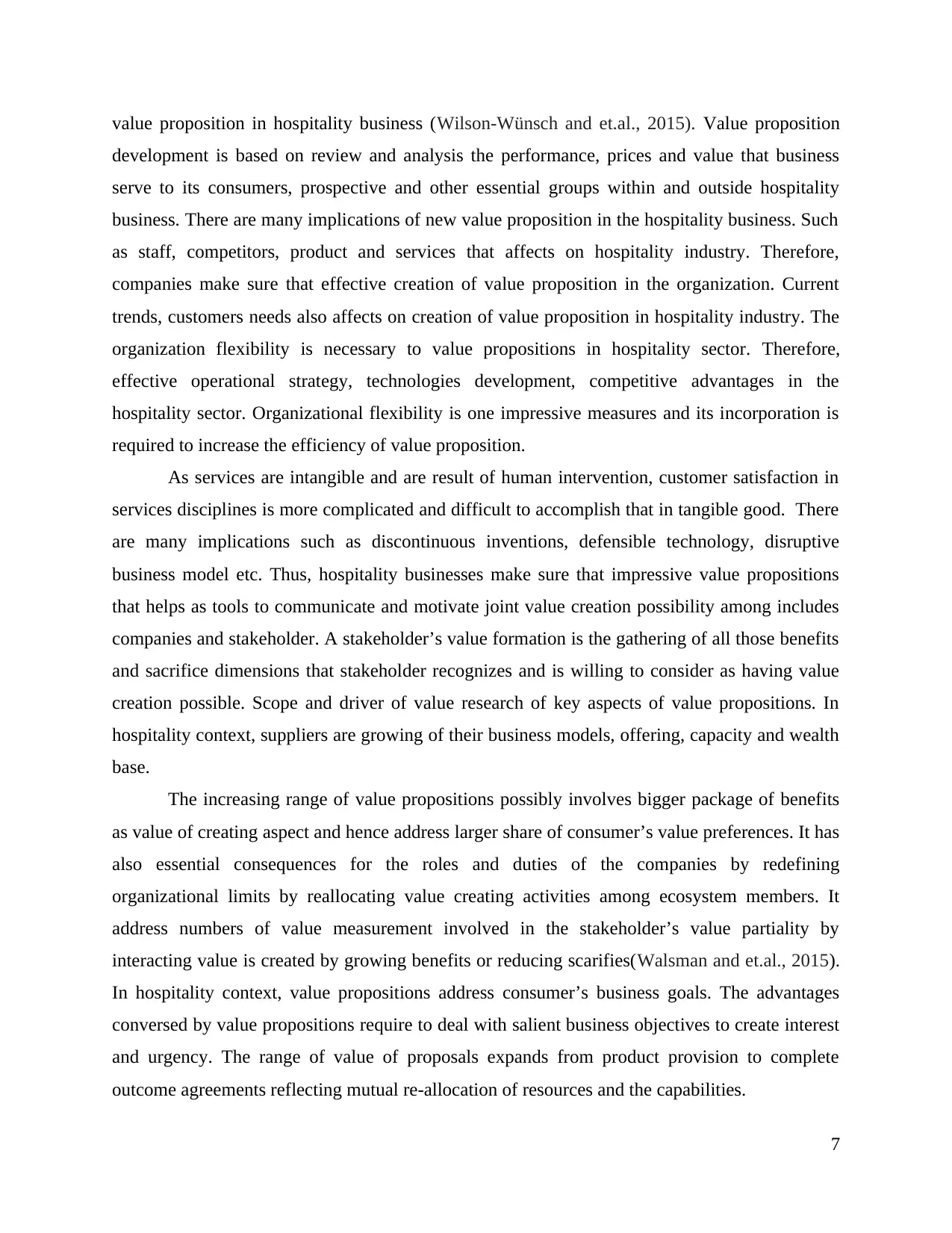
value proposition in hospitality business (Wilson-Wünsch and et.al., 2015). Value proposition
development is based on review and analysis the performance, prices and value that business
serve to its consumers, prospective and other essential groups within and outside hospitality
business. There are many implications of new value proposition in the hospitality business. Such
as staff, competitors, product and services that affects on hospitality industry. Therefore,
companies make sure that effective creation of value proposition in the organization. Current
trends, customers needs also affects on creation of value proposition in hospitality industry. The
organization flexibility is necessary to value propositions in hospitality sector. Therefore,
effective operational strategy, technologies development, competitive advantages in the
hospitality sector. Organizational flexibility is one impressive measures and its incorporation is
required to increase the efficiency of value proposition.
As services are intangible and are result of human intervention, customer satisfaction in
services disciplines is more complicated and difficult to accomplish that in tangible good. There
are many implications such as discontinuous inventions, defensible technology, disruptive
business model etc. Thus, hospitality businesses make sure that impressive value propositions
that helps as tools to communicate and motivate joint value creation possibility among includes
companies and stakeholder. A stakeholder’s value formation is the gathering of all those benefits
and sacrifice dimensions that stakeholder recognizes and is willing to consider as having value
creation possible. Scope and driver of value research of key aspects of value propositions. In
hospitality context, suppliers are growing of their business models, offering, capacity and wealth
base.
The increasing range of value propositions possibly involves bigger package of benefits
as value of creating aspect and hence address larger share of consumer’s value preferences. It has
also essential consequences for the roles and duties of the companies by redefining
organizational limits by reallocating value creating activities among ecosystem members. It
address numbers of value measurement involved in the stakeholder’s value partiality by
interacting value is created by growing benefits or reducing scarifies(Walsman and et.al., 2015).
In hospitality context, value propositions address consumer’s business goals. The advantages
conversed by value propositions require to deal with salient business objectives to create interest
and urgency. The range of value of proposals expands from product provision to complete
outcome agreements reflecting mutual re-allocation of resources and the capabilities.
7
development is based on review and analysis the performance, prices and value that business
serve to its consumers, prospective and other essential groups within and outside hospitality
business. There are many implications of new value proposition in the hospitality business. Such
as staff, competitors, product and services that affects on hospitality industry. Therefore,
companies make sure that effective creation of value proposition in the organization. Current
trends, customers needs also affects on creation of value proposition in hospitality industry. The
organization flexibility is necessary to value propositions in hospitality sector. Therefore,
effective operational strategy, technologies development, competitive advantages in the
hospitality sector. Organizational flexibility is one impressive measures and its incorporation is
required to increase the efficiency of value proposition.
As services are intangible and are result of human intervention, customer satisfaction in
services disciplines is more complicated and difficult to accomplish that in tangible good. There
are many implications such as discontinuous inventions, defensible technology, disruptive
business model etc. Thus, hospitality businesses make sure that impressive value propositions
that helps as tools to communicate and motivate joint value creation possibility among includes
companies and stakeholder. A stakeholder’s value formation is the gathering of all those benefits
and sacrifice dimensions that stakeholder recognizes and is willing to consider as having value
creation possible. Scope and driver of value research of key aspects of value propositions. In
hospitality context, suppliers are growing of their business models, offering, capacity and wealth
base.
The increasing range of value propositions possibly involves bigger package of benefits
as value of creating aspect and hence address larger share of consumer’s value preferences. It has
also essential consequences for the roles and duties of the companies by redefining
organizational limits by reallocating value creating activities among ecosystem members. It
address numbers of value measurement involved in the stakeholder’s value partiality by
interacting value is created by growing benefits or reducing scarifies(Walsman and et.al., 2015).
In hospitality context, value propositions address consumer’s business goals. The advantages
conversed by value propositions require to deal with salient business objectives to create interest
and urgency. The range of value of proposals expands from product provision to complete
outcome agreements reflecting mutual re-allocation of resources and the capabilities.
7
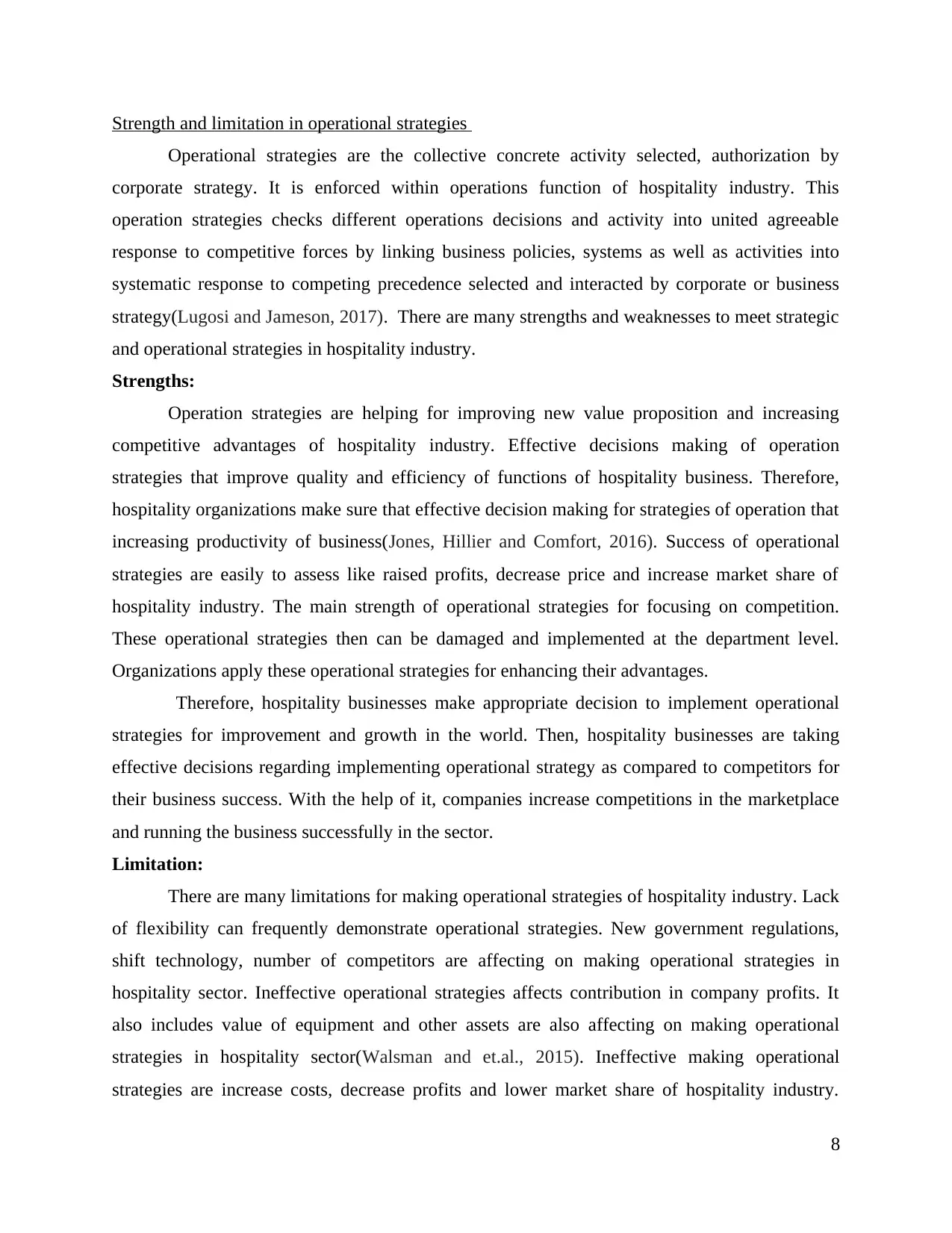
Strength and limitation in operational strategies
Operational strategies are the collective concrete activity selected, authorization by
corporate strategy. It is enforced within operations function of hospitality industry. This
operation strategies checks different operations decisions and activity into united agreeable
response to competitive forces by linking business policies, systems as well as activities into
systematic response to competing precedence selected and interacted by corporate or business
strategy(Lugosi and Jameson, 2017). There are many strengths and weaknesses to meet strategic
and operational strategies in hospitality industry.
Strengths:
Operation strategies are helping for improving new value proposition and increasing
competitive advantages of hospitality industry. Effective decisions making of operation
strategies that improve quality and efficiency of functions of hospitality business. Therefore,
hospitality organizations make sure that effective decision making for strategies of operation that
increasing productivity of business(Jones, Hillier and Comfort, 2016). Success of operational
strategies are easily to assess like raised profits, decrease price and increase market share of
hospitality industry. The main strength of operational strategies for focusing on competition.
These operational strategies then can be damaged and implemented at the department level.
Organizations apply these operational strategies for enhancing their advantages.
Therefore, hospitality businesses make appropriate decision to implement operational
strategies for improvement and growth in the world. Then, hospitality businesses are taking
effective decisions regarding implementing operational strategy as compared to competitors for
their business success. With the help of it, companies increase competitions in the marketplace
and running the business successfully in the sector.
Limitation:
There are many limitations for making operational strategies of hospitality industry. Lack
of flexibility can frequently demonstrate operational strategies. New government regulations,
shift technology, number of competitors are affecting on making operational strategies in
hospitality sector. Ineffective operational strategies affects contribution in company profits. It
also includes value of equipment and other assets are also affecting on making operational
strategies in hospitality sector(Walsman and et.al., 2015). Ineffective making operational
strategies are increase costs, decrease profits and lower market share of hospitality industry.
8
Operational strategies are the collective concrete activity selected, authorization by
corporate strategy. It is enforced within operations function of hospitality industry. This
operation strategies checks different operations decisions and activity into united agreeable
response to competitive forces by linking business policies, systems as well as activities into
systematic response to competing precedence selected and interacted by corporate or business
strategy(Lugosi and Jameson, 2017). There are many strengths and weaknesses to meet strategic
and operational strategies in hospitality industry.
Strengths:
Operation strategies are helping for improving new value proposition and increasing
competitive advantages of hospitality industry. Effective decisions making of operation
strategies that improve quality and efficiency of functions of hospitality business. Therefore,
hospitality organizations make sure that effective decision making for strategies of operation that
increasing productivity of business(Jones, Hillier and Comfort, 2016). Success of operational
strategies are easily to assess like raised profits, decrease price and increase market share of
hospitality industry. The main strength of operational strategies for focusing on competition.
These operational strategies then can be damaged and implemented at the department level.
Organizations apply these operational strategies for enhancing their advantages.
Therefore, hospitality businesses make appropriate decision to implement operational
strategies for improvement and growth in the world. Then, hospitality businesses are taking
effective decisions regarding implementing operational strategy as compared to competitors for
their business success. With the help of it, companies increase competitions in the marketplace
and running the business successfully in the sector.
Limitation:
There are many limitations for making operational strategies of hospitality industry. Lack
of flexibility can frequently demonstrate operational strategies. New government regulations,
shift technology, number of competitors are affecting on making operational strategies in
hospitality sector. Ineffective operational strategies affects contribution in company profits. It
also includes value of equipment and other assets are also affecting on making operational
strategies in hospitality sector(Walsman and et.al., 2015). Ineffective making operational
strategies are increase costs, decrease profits and lower market share of hospitality industry.
8
⊘ This is a preview!⊘
Do you want full access?
Subscribe today to unlock all pages.

Trusted by 1+ million students worldwide
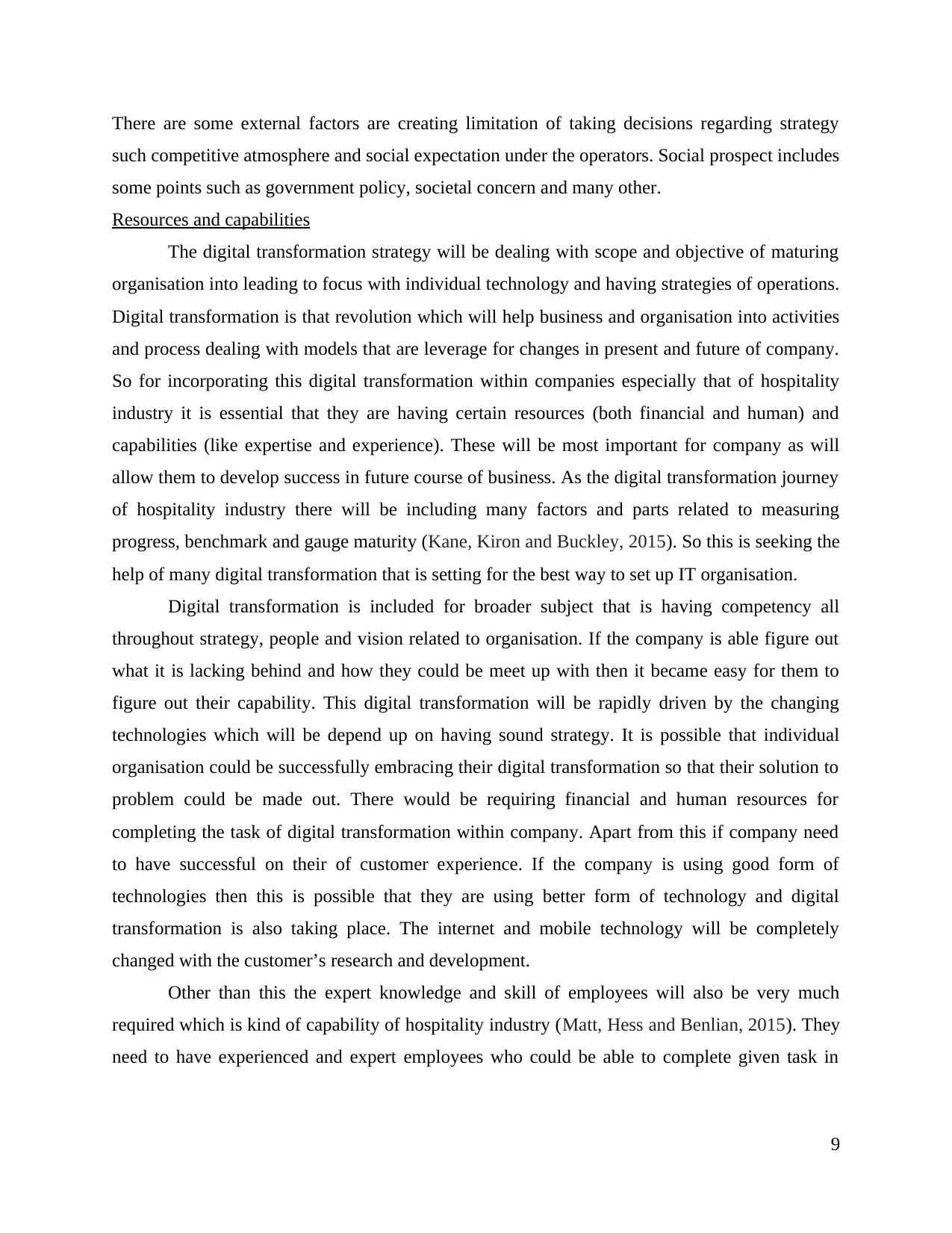
There are some external factors are creating limitation of taking decisions regarding strategy
such competitive atmosphere and social expectation under the operators. Social prospect includes
some points such as government policy, societal concern and many other.
Resources and capabilities
The digital transformation strategy will be dealing with scope and objective of maturing
organisation into leading to focus with individual technology and having strategies of operations.
Digital transformation is that revolution which will help business and organisation into activities
and process dealing with models that are leverage for changes in present and future of company.
So for incorporating this digital transformation within companies especially that of hospitality
industry it is essential that they are having certain resources (both financial and human) and
capabilities (like expertise and experience). These will be most important for company as will
allow them to develop success in future course of business. As the digital transformation journey
of hospitality industry there will be including many factors and parts related to measuring
progress, benchmark and gauge maturity (Kane, Kiron and Buckley, 2015). So this is seeking the
help of many digital transformation that is setting for the best way to set up IT organisation.
Digital transformation is included for broader subject that is having competency all
throughout strategy, people and vision related to organisation. If the company is able figure out
what it is lacking behind and how they could be meet up with then it became easy for them to
figure out their capability. This digital transformation will be rapidly driven by the changing
technologies which will be depend up on having sound strategy. It is possible that individual
organisation could be successfully embracing their digital transformation so that their solution to
problem could be made out. There would be requiring financial and human resources for
completing the task of digital transformation within company. Apart from this if company need
to have successful on their of customer experience. If the company is using good form of
technologies then this is possible that they are using better form of technology and digital
transformation is also taking place. The internet and mobile technology will be completely
changed with the customer’s research and development.
Other than this the expert knowledge and skill of employees will also be very much
required which is kind of capability of hospitality industry (Matt, Hess and Benlian, 2015). They
need to have experienced and expert employees who could be able to complete given task in
9
such competitive atmosphere and social expectation under the operators. Social prospect includes
some points such as government policy, societal concern and many other.
Resources and capabilities
The digital transformation strategy will be dealing with scope and objective of maturing
organisation into leading to focus with individual technology and having strategies of operations.
Digital transformation is that revolution which will help business and organisation into activities
and process dealing with models that are leverage for changes in present and future of company.
So for incorporating this digital transformation within companies especially that of hospitality
industry it is essential that they are having certain resources (both financial and human) and
capabilities (like expertise and experience). These will be most important for company as will
allow them to develop success in future course of business. As the digital transformation journey
of hospitality industry there will be including many factors and parts related to measuring
progress, benchmark and gauge maturity (Kane, Kiron and Buckley, 2015). So this is seeking the
help of many digital transformation that is setting for the best way to set up IT organisation.
Digital transformation is included for broader subject that is having competency all
throughout strategy, people and vision related to organisation. If the company is able figure out
what it is lacking behind and how they could be meet up with then it became easy for them to
figure out their capability. This digital transformation will be rapidly driven by the changing
technologies which will be depend up on having sound strategy. It is possible that individual
organisation could be successfully embracing their digital transformation so that their solution to
problem could be made out. There would be requiring financial and human resources for
completing the task of digital transformation within company. Apart from this if company need
to have successful on their of customer experience. If the company is using good form of
technologies then this is possible that they are using better form of technology and digital
transformation is also taking place. The internet and mobile technology will be completely
changed with the customer’s research and development.
Other than this the expert knowledge and skill of employees will also be very much
required which is kind of capability of hospitality industry (Matt, Hess and Benlian, 2015). They
need to have experienced and expert employees who could be able to complete given task in
9
Paraphrase This Document
Need a fresh take? Get an instant paraphrase of this document with our AI Paraphraser
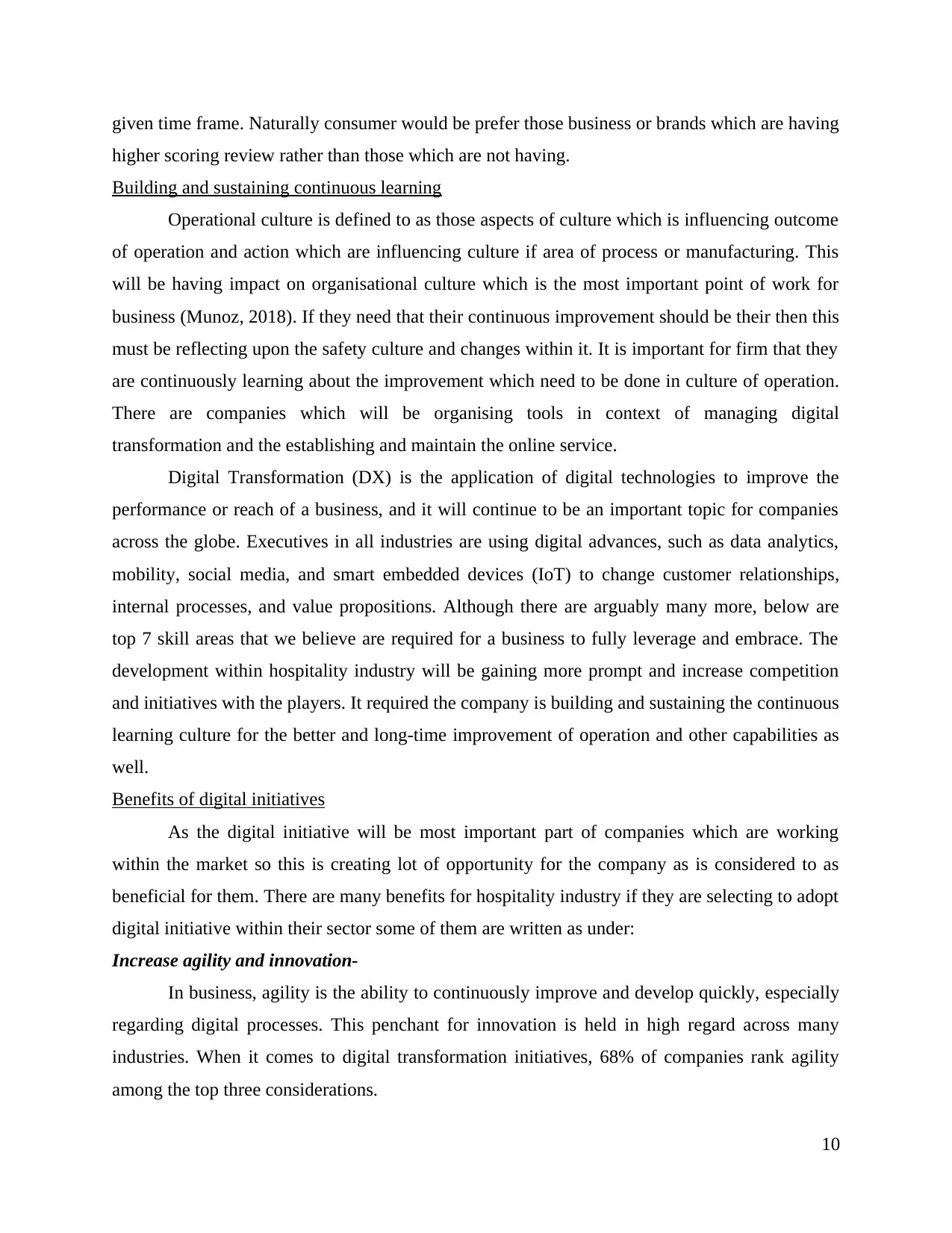
given time frame. Naturally consumer would be prefer those business or brands which are having
higher scoring review rather than those which are not having.
Building and sustaining continuous learning
Operational culture is defined to as those aspects of culture which is influencing outcome
of operation and action which are influencing culture if area of process or manufacturing. This
will be having impact on organisational culture which is the most important point of work for
business (Munoz, 2018). If they need that their continuous improvement should be their then this
must be reflecting upon the safety culture and changes within it. It is important for firm that they
are continuously learning about the improvement which need to be done in culture of operation.
There are companies which will be organising tools in context of managing digital
transformation and the establishing and maintain the online service.
Digital Transformation (DX) is the application of digital technologies to improve the
performance or reach of a business, and it will continue to be an important topic for companies
across the globe. Executives in all industries are using digital advances, such as data analytics,
mobility, social media, and smart embedded devices (IoT) to change customer relationships,
internal processes, and value propositions. Although there are arguably many more, below are
top 7 skill areas that we believe are required for a business to fully leverage and embrace. The
development within hospitality industry will be gaining more prompt and increase competition
and initiatives with the players. It required the company is building and sustaining the continuous
learning culture for the better and long-time improvement of operation and other capabilities as
well.
Benefits of digital initiatives
As the digital initiative will be most important part of companies which are working
within the market so this is creating lot of opportunity for the company as is considered to as
beneficial for them. There are many benefits for hospitality industry if they are selecting to adopt
digital initiative within their sector some of them are written as under:
Increase agility and innovation-
In business, agility is the ability to continuously improve and develop quickly, especially
regarding digital processes. This penchant for innovation is held in high regard across many
industries. When it comes to digital transformation initiatives, 68% of companies rank agility
among the top three considerations.
10
higher scoring review rather than those which are not having.
Building and sustaining continuous learning
Operational culture is defined to as those aspects of culture which is influencing outcome
of operation and action which are influencing culture if area of process or manufacturing. This
will be having impact on organisational culture which is the most important point of work for
business (Munoz, 2018). If they need that their continuous improvement should be their then this
must be reflecting upon the safety culture and changes within it. It is important for firm that they
are continuously learning about the improvement which need to be done in culture of operation.
There are companies which will be organising tools in context of managing digital
transformation and the establishing and maintain the online service.
Digital Transformation (DX) is the application of digital technologies to improve the
performance or reach of a business, and it will continue to be an important topic for companies
across the globe. Executives in all industries are using digital advances, such as data analytics,
mobility, social media, and smart embedded devices (IoT) to change customer relationships,
internal processes, and value propositions. Although there are arguably many more, below are
top 7 skill areas that we believe are required for a business to fully leverage and embrace. The
development within hospitality industry will be gaining more prompt and increase competition
and initiatives with the players. It required the company is building and sustaining the continuous
learning culture for the better and long-time improvement of operation and other capabilities as
well.
Benefits of digital initiatives
As the digital initiative will be most important part of companies which are working
within the market so this is creating lot of opportunity for the company as is considered to as
beneficial for them. There are many benefits for hospitality industry if they are selecting to adopt
digital initiative within their sector some of them are written as under:
Increase agility and innovation-
In business, agility is the ability to continuously improve and develop quickly, especially
regarding digital processes. This penchant for innovation is held in high regard across many
industries. When it comes to digital transformation initiatives, 68% of companies rank agility
among the top three considerations.
10
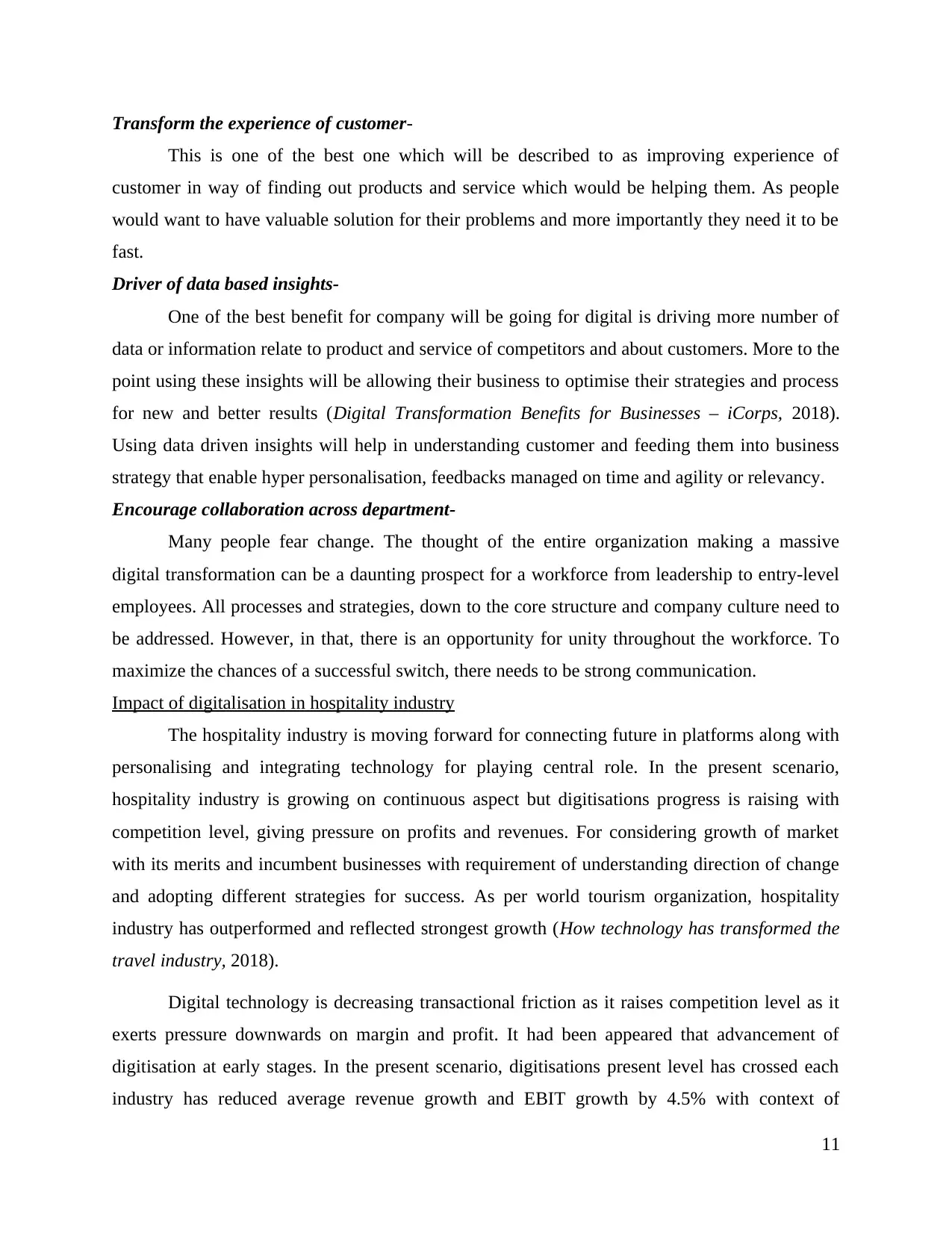
Transform the experience of customer-
This is one of the best one which will be described to as improving experience of
customer in way of finding out products and service which would be helping them. As people
would want to have valuable solution for their problems and more importantly they need it to be
fast.
Driver of data based insights-
One of the best benefit for company will be going for digital is driving more number of
data or information relate to product and service of competitors and about customers. More to the
point using these insights will be allowing their business to optimise their strategies and process
for new and better results (Digital Transformation Benefits for Businesses – iCorps, 2018).
Using data driven insights will help in understanding customer and feeding them into business
strategy that enable hyper personalisation, feedbacks managed on time and agility or relevancy.
Encourage collaboration across department-
Many people fear change. The thought of the entire organization making a massive
digital transformation can be a daunting prospect for a workforce from leadership to entry-level
employees. All processes and strategies, down to the core structure and company culture need to
be addressed. However, in that, there is an opportunity for unity throughout the workforce. To
maximize the chances of a successful switch, there needs to be strong communication.
Impact of digitalisation in hospitality industry
The hospitality industry is moving forward for connecting future in platforms along with
personalising and integrating technology for playing central role. In the present scenario,
hospitality industry is growing on continuous aspect but digitisations progress is raising with
competition level, giving pressure on profits and revenues. For considering growth of market
with its merits and incumbent businesses with requirement of understanding direction of change
and adopting different strategies for success. As per world tourism organization, hospitality
industry has outperformed and reflected strongest growth (How technology has transformed the
travel industry, 2018).
Digital technology is decreasing transactional friction as it raises competition level as it
exerts pressure downwards on margin and profit. It had been appeared that advancement of
digitisation at early stages. In the present scenario, digitisations present level has crossed each
industry has reduced average revenue growth and EBIT growth by 4.5% with context of
11
This is one of the best one which will be described to as improving experience of
customer in way of finding out products and service which would be helping them. As people
would want to have valuable solution for their problems and more importantly they need it to be
fast.
Driver of data based insights-
One of the best benefit for company will be going for digital is driving more number of
data or information relate to product and service of competitors and about customers. More to the
point using these insights will be allowing their business to optimise their strategies and process
for new and better results (Digital Transformation Benefits for Businesses – iCorps, 2018).
Using data driven insights will help in understanding customer and feeding them into business
strategy that enable hyper personalisation, feedbacks managed on time and agility or relevancy.
Encourage collaboration across department-
Many people fear change. The thought of the entire organization making a massive
digital transformation can be a daunting prospect for a workforce from leadership to entry-level
employees. All processes and strategies, down to the core structure and company culture need to
be addressed. However, in that, there is an opportunity for unity throughout the workforce. To
maximize the chances of a successful switch, there needs to be strong communication.
Impact of digitalisation in hospitality industry
The hospitality industry is moving forward for connecting future in platforms along with
personalising and integrating technology for playing central role. In the present scenario,
hospitality industry is growing on continuous aspect but digitisations progress is raising with
competition level, giving pressure on profits and revenues. For considering growth of market
with its merits and incumbent businesses with requirement of understanding direction of change
and adopting different strategies for success. As per world tourism organization, hospitality
industry has outperformed and reflected strongest growth (How technology has transformed the
travel industry, 2018).
Digital technology is decreasing transactional friction as it raises competition level as it
exerts pressure downwards on margin and profit. It had been appeared that advancement of
digitisation at early stages. In the present scenario, digitisations present level has crossed each
industry has reduced average revenue growth and EBIT growth by 4.5% with context of
11
⊘ This is a preview!⊘
Do you want full access?
Subscribe today to unlock all pages.

Trusted by 1+ million students worldwide
1 out of 16
Related Documents
Your All-in-One AI-Powered Toolkit for Academic Success.
+13062052269
info@desklib.com
Available 24*7 on WhatsApp / Email
![[object Object]](/_next/static/media/star-bottom.7253800d.svg)
Unlock your academic potential
Copyright © 2020–2026 A2Z Services. All Rights Reserved. Developed and managed by ZUCOL.




